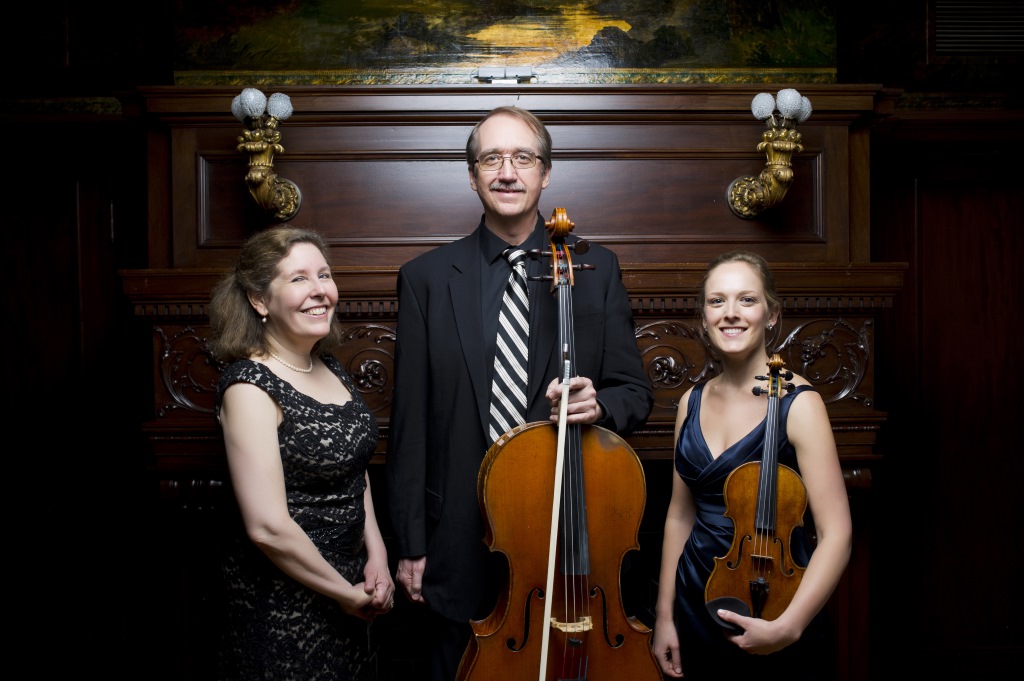Prometheus Trio Serves Up A Banquet
New member cooks in varied presentation of composers and styles.
You do not get to pick from a menu at a chamber music concert—the chef has made the choices for you. You come hungry and hope that whatever the kitchen has in mind doesn’t involve nouvelle cuisine experiments using raisins and okra. Prometheans Stefanie Jacob, piano; Scott Tisdel, cello; and newcomer Margot Schwartz, violin, were cooking with gas in their season opener, and they served up a feast.
The concert began with a delicious reading of Gaetano Donizetti’s single-movement gem identified blandly as Trio in E-flat Major. There was nothing bland about this work. Tuneful, happy melodies in the violin and soulful lyricism from the cello made for a tasty start. Schwartz makes a significant contribution to the elegance of Prometheus Trio’s musical identity. She has a luxuriant tone that seems to have no limits. When she plays fortissimo, her sound gets bigger without the harshness associated with pushing too hard. When she plays pianissimo, the sound floats effortlessly while maintaining tonal purity. That is very impressive. However, what tends to make a bigger impression is the maturity of her musical thinking. Jacob and Tisdel together are formidable collaborators, with years of intelligent and impassioned music-making under their belts. Schwartz enhances the flavor of the group with tastefully seasoned violin lines that pair beautifully with Tisdel’s umami-rich sound and Jacob’s musical gourmet emporium.
The Elegie, Op. 23, by Josef Suk, was a paean to fidelity and moral fiber, and as a palate cleanser, it was deeply satisfying. Above a fluttering heartbeat from Jacob’s piano, Schwartz lofted a beautiful melody that was passed over to Tisdel—my goodness, he has a warm sound. Tender duos in the strings sounded balanced and nuanced. After a brief dramatic surge and solemn hymn-like section, the opening theme returned in the strings and wafted away. The Suk was a lovely way to offset the energy that came next in the Smetana.
Bedrich Smetana’s Trio in G Minor, Op. 15 was the entrée, and it was delectable. This rather nationalistic-sounding composition began the Moderato assai with a dramatic, gypsy-like snippet in the violin, and it rollicked forward with adamant phrases and abundant patriotic fervor. In this movement, the trio started to feel its oats. After what up to now had been a display of fine individual playing and rehearsed precision, the Prometheans let out all the stops and played like chamber music was fun. Electrifying tremolo passages were followed by a gentle return to the opening theme settled nicely on a brief piano interlude. There was a recap of the violin theme and then a race to the end of the movement that was an exuberant display of the trio’s skills. The Allegro, non agitato featured a melody with a driving, dotted rhythm that was sometimes charming, always lyrical, and often impassioned. The movement disappeared into the air with a set of quiet pizzicato chords. Finale: Presto flew out of Jacob’s hands in rapid-fire triplets and went like the wind. There was a cantabile section in which Jacob was quite impressive with fluid lines and elegant technique. The Presto was then interrupted by a tender-hearted theme in the cello and violin and once again redirected with a funeral section à la Beethoven. The trio managed to play with abandon while conveying ease and confidence in this barnburner of a composition.
Stefanie Jacob’s arrangement of “Our Evenings,” a piano work by Leoš Janáček from a cycle of thirteen pieces titled On an Overgrown Path, was a delightfully sweet dessert to set out for a very appreciative audience. Schwartz, Tisdel, and Jacob laid out a varied repast for listeners that was a delectable way to celebrate their new partnership. They meanwhile brought out the best in one another and shone as individuals. There will be much to look forward to in this collaboration.
Review
-
Eating Burmese in Bay View
 Dec 13th, 2025 by Cari Taylor-Carlson
Dec 13th, 2025 by Cari Taylor-Carlson
-
Casablanca Is a Milwaukee Success
 Nov 30th, 2025 by Cari Taylor-Carlson
Nov 30th, 2025 by Cari Taylor-Carlson
-
Oh, Those Witty 18th Century Brits
 Nov 24th, 2025 by Dominique Paul Noth
Nov 24th, 2025 by Dominique Paul Noth





















